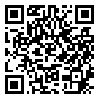1. Alvai, M. Linder, D.E. (2001). Knowledge mangement and knowledge management system : Conceptual foundations and research Issue , MS Quartery, vol.25,no.I,pp. 107-32. [
DOI:10.2307/3250961]
2. Boer N., Berends H., Van Baalen, P. Relational models for knowledge sharing behavior. European (2011) Management Journal;29: 85- 97. [
DOI:10.1016/j.emj.2010.10.009]
3. Bock, G.W., R.W. Zmud, and Y.G. Kim. 2006. Behavioral intention formation in knowledge sharing: examining the roles of extrinsic motivators,
4. socialѧـpsychological forces, and organizational climate. MIS Quarterly (29)1: 87-111.
5. Carmeli, A., Atwater, L., & Levi, A. (2011). Howleadership enhances employees' knowledge sharing: the intervening.
6. Chesebrough, D. E., & President, P. (2006). Knowledge management a tool for SMEs to enhance competitiveness. CACCI Journal, 1, 1-12.
7. Dove ,B & Koshela, (2009) . Collaborative knowledge management- A cost ruction case study , Journal of Automation in Construction , 18,894-902. [
DOI:10.1016/j.autcon.2009.03.015]
8. Hsu C. Knowledge sharing practices as a facilitating factor formproving organizational performance though human capital: Preliminary test: Export systems with applications 2008; 35:1316-1326. [
DOI:10.1016/j.eswa.2007.08.012]
9. Huang Ch. Knowledge sharing and group cohesiveness on performance: an empirical study of technology R&D teams inTaiwan. Technovation 2009; 29: 786-797. [
DOI:10.1016/j.technovation.2009.04.003]
10. Hales, Steve. (2001).Dimensions knowledge and its management.available at: www.insighting .co.uk.
11. Hooff B., Husman M. Managing knowledge sharing: emergentand engineering approaches": Information and Management 2009;46: 1-8. [
DOI:10.1016/j.im.2008.09.002]
12. Ji L-M., Hung J., Chen S-W., Jou C. Fostering the determinants of knowledge sharing, virtual communities. Computers in HumanBehavior 2009; 929-939. [
DOI:10.1016/j.chb.2009.03.008]
13. Lam, A., & Ford, J. P. (2010). Knowledge Sharing in Organisational Contexts: a Motivation-Based Perspective. Journal of Knowledge Management, 14, 51-66. [
DOI:10.1108/13673271011015561]
14. Lee,J,N.(2001).The impact of knowledge sharing. Organizational capability and partnership guality on is outsourcing success. Information and management: Vo1.38.No.5.pp.5323-35. [
DOI:10.1016/S0378-7206(00)00074-4]
15. Roles of Relational and Organizational Identification. J Technol Transf, 5, 257-274.
16. Renzl B. Trust in management and knowledge sharing: Themediating effects of fear and knowledge documentation. Omega2008; 36: 206-220. [
DOI:10.1016/j.omega.2006.06.005]
17. Siemsen, E., Roth, A. V., & Balasubramanian, S. (2008). How Motivation, Opportunity, and Ability Drive Knowledge Sharing:The Constraining-factor Model. Journal of Operations Management, 26, 426-445. [
DOI:10.1016/j.jom.2007.09.001]
18. Tsai, M.-T., Chen, K.-S., & Chien, J.-L. (2012). The Factors Impact of Knowledge Sharing Intentions: the Theory of Reasoned action Perspective. Qual Quant, 46, 1479-1491. [
DOI:10.1007/s11135-011-9462-9]
19. Wang Sh., Noe R. Knowledge sharing: A review and directionsfor future research. Human Resource Management Review 2010;20(2): Publisher: Elsevier In., 115-131. [
DOI:10.1016/j.hrmr.2009.10.001]
20. Wang Sh., Noe R. Knowledge sharing: A review and directionsfor future research. Human Resource Management Review 2010;20(2): Publisher: Elsevier [
DOI:10.1016/j.hrmr.2009.10.001]
21. In., 115-131.
22. Zahra S., Neubaum D., Larrañeta B. Knowledge sharing andtechnological capabilities: The moderating role of familyinvolvement. Journal of Business Research 2007; 60(10): 1070-1079. [
DOI:10.1016/j.jbusres.2006.12.014]
23. Mc Dermott, R.(1999), "Why information technology inspired but cannot deliver knowledge management" California management review, Vol.23.No2,pp.242-66.







